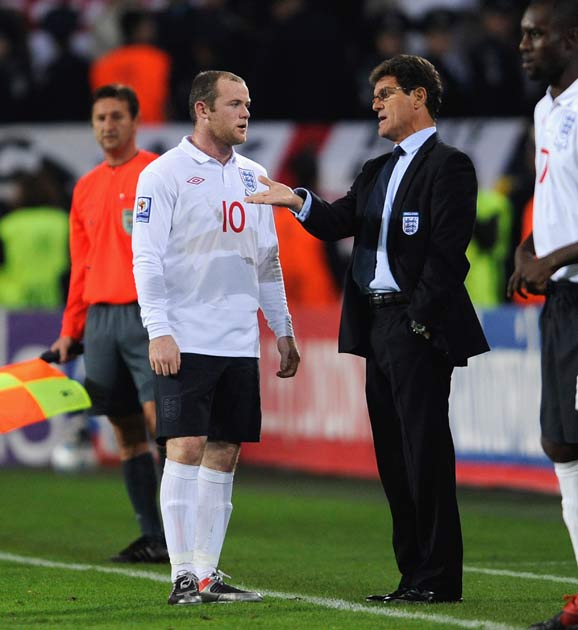Capello cracks whip to free Three Lions
Disciplinarian finds a way to make most of talents of Rooney and Gerrard but jury is out until after World Cup finals

Your support helps us to tell the story
From reproductive rights to climate change to Big Tech, The Independent is on the ground when the story is developing. Whether it's investigating the financials of Elon Musk's pro-Trump PAC or producing our latest documentary, 'The A Word', which shines a light on the American women fighting for reproductive rights, we know how important it is to parse out the facts from the messaging.
At such a critical moment in US history, we need reporters on the ground. Your donation allows us to keep sending journalists to speak to both sides of the story.
The Independent is trusted by Americans across the entire political spectrum. And unlike many other quality news outlets, we choose not to lock Americans out of our reporting and analysis with paywalls. We believe quality journalism should be available to everyone, paid for by those who can afford it.
Your support makes all the difference.As with any winter sport, reviewing a calendar year carries a sense of unfinished business; all the more so with a World Cup to come. In choosing 100 heroes or villains from the past decade last week, this newspaper justifably placed Fabio Capello in the former category. Of vastly greater import for English football, however, is which classification he will merit in 12 months' time. Or seven months, to be precise, since by mid-July the manager's heroic status and the national game's standing will be up for revision.
What can be said about Capello and his team is that the signs from 2009 were broadly encouraging, success in the qualifying group having been confirmed with a 5-1 flourish against Croatia in September. He has clearly established a new discipline as well as successfully trying out variations on a favoured 4-2-3-1 formation best utilising the talents of Wayne Rooney and Steven Gerrard.
Yet when the World Cup draw brought no more demanding a trio of opponents than the United States, Slovenia and Algeria, it was easy to forget that the international year had been book-ended by defeats against the real favourites next summer, Spain and Brazil. England went into the Brazil game (played, bizarrely, in the November heat of Qatar) with a dozen players unavailable which, according to point of view, mitigated the effect of a 1-0 loss or provided a reminder of how injuries undermined previous tournament finals.
At least England will be there. The Republic of Ireland will not, their hopes dashed in a play-off by the year's most controversial moment, in which Thierry Henry's hand propelled the ball across goal for William Gallas to score. Good may yet come of it, in that Fifa announced a full inquiry into the effect of video technology and extra assistants, whose human fallibility was underlined when one of them wanted to send off the wrong Fulham player in a Europa League game.
The authorities took an equally belated interest in football's finances, Uefa threatening to ban clubs with excessive debt from their competitions. The Premier League published aggregate agents' fees for each club, although official transfer fees are apparently still none of our business. The world's richest League was even faced with the possibility of one of those clubs, Portsmouth, going into administration after discovering, like Newcastle United, that in a worldwide recession there was suddenly less enthusiasm for football as a rich man's toy.
Portsmouth had spent heavily in pursuit of success; Manchester City did the same but from an infinitely stronger base, attracting conflicting feelings. Widespread gratitude at a serious challenge to the acknowledged Big Four was balanced, if not outweighed, by popular revulsion at Mark Hughes' sacking. In the new year there will therefore be less support for City's challenge under Roberto Mancini than that of other recovering power-houses such as Aston Villa and Tottenham.
The traditional quartet not only dominated last season's League table but all reached the later stages of the Champions' League again. Liverpool's failure to do so this time, coupled with losing well over a third of their games so far this season, hinted at a possible shift in power even as Chelsea, the FA Cup holders, and Manchester United, champions again, confirmed their domestic superiority.
Three to watch
Seamus Coleman (Everton): The 21-year-old full-back from Donegal made a stunning impression on his Premier League debut earlier this month, transforming the game against Spurs. A hard worker in training who has shown the character to overcome serious injury.
Connor Wickham (Ipswich Town): At 6ft 3in and 11st 6lb, the youngest player ever to represent Ipswich (aged 16 and 11 days) still has some growing to do, which is bad news for defenders. His power and pace brought a first-half hat-trick for England Under-17s.
Jack Wilshere (Arsenal): Clever, confident midfielder, 18 on New Year's Day, who has never looked out of place while coming through the ranks. Has been fast-tracked to England Under-20s and Under-21s and may be loaned next month to give him more League games.
Steve Tongue
Join our commenting forum
Join thought-provoking conversations, follow other Independent readers and see their replies
Comments